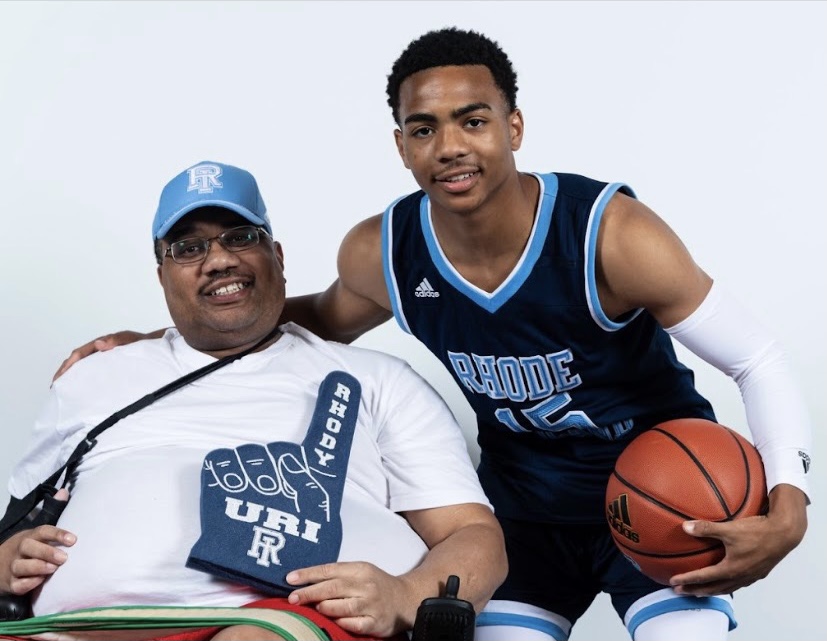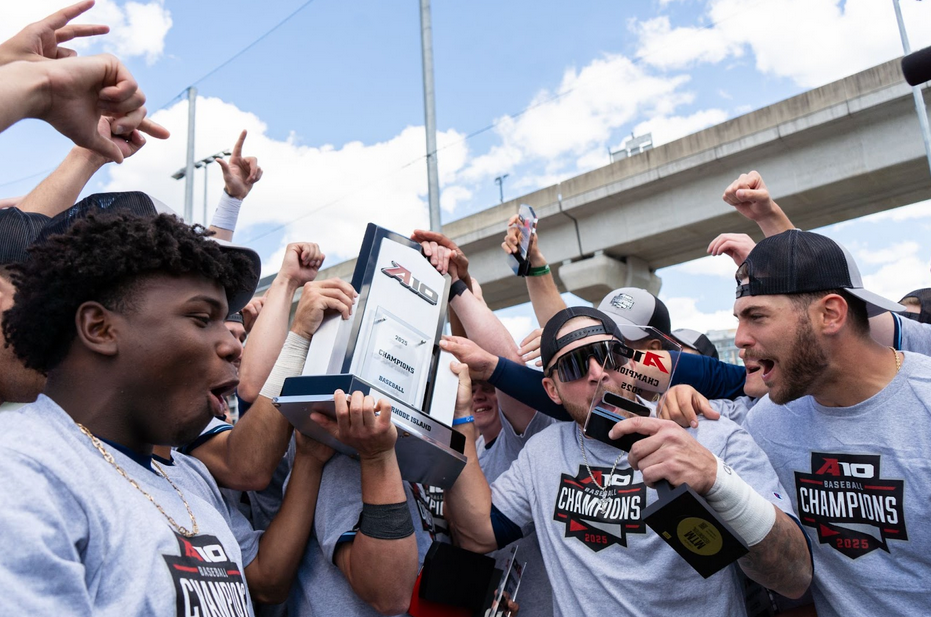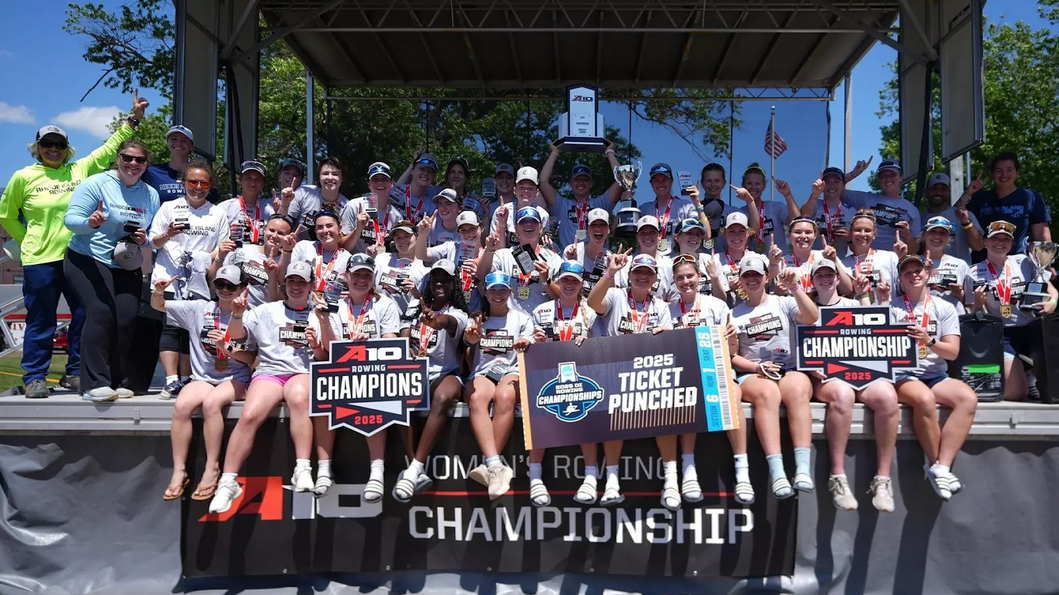Ishmael with his father Detrick during his official visit at URI in 2019. PHOTO CREDIT: Ishmael Leggett
On a regular day during his freshman year at St. John’s College High School in his hometown of Washington D.C., Ishmael Leggett was on his way to his high school varsity basketball game. He was sitting in the passenger seat while his father, Detrick Leggett, drove.
Everything was quiet and calm, until traffic began to pick up in the tunnel they were driving through. Cars halted to a gridlock, but Leggett’s car kept driving. As they hit the car in front of them, Leggett looked over to see his dad, whose foot was still on the pedal while completely unconscious. The woman in the car in front pulled Leggett, who wasn’t injured, back into reality, telling him to call 911. The ambulances took his dad to the hospital where he underwent an emergency four-hour surgery after suffering a brain aneurysm.
After the crash, Leggett did go to his game, but his mind remained on his father.
“I didn’t play much because my coach pulled me from the game after knowing what happened,” he said. “All I remember is missing two free throws.”
A few months after the crash, Leggett and his family received the news that his dad was diagnosed with expressive aphasia, a communicative disorder that damaged his brain, causing him to lose the ability to speak and to walk.
Leggett recalled his dad getting analyzed for constant migraines before the accident, but he was told it was just an ear infection. After Detrick was diagnosed with aphasia, it was discovered that blood vessels burst on the left side of his brain, causing the loss of his motor movements. Detrick was left in a wheelchair and unable to form words or sentences. In some cases of aphasia, individuals are able to regain some ability to speak after a second surgery, but unfortunately, Detrick’s speech did not recover after his second procedure. The condition also meant that his dad would be unable to attend all of his games. This gave Leggett new motivation behind playing basketball.
Freshman year is already an adjustment period as it is, but his father’s diagnosis with aphasia made it even harder to adapt. Leggett, who called his father his biggest supporter on the court, would no longer be able to hear his loud and encouraging words.
“You would know that’s Ish’s dad,” Leggett said.
Leggett always had a close relationship with Detrick and basketball was their greatest shared passion.
“He always made sure I was in a good position to succeed,” Leggett said. “He would drive me to my all-boys private middle school every morning that was an hour away from where I lived. I went to that school to play for an elite basketball program and my dad drove me everytime.”
He also received so many opportunities because of his father and continues to play basketball to make him proud. He even got a tattoo on his right arm that reads, “A4D” or “All for Detrick” to honor his father.
Leggett’s mom, Renee, has made huge sacrifices to support her son following the incident including taking on the role of “Momanger” and taking the train from Maryland to Rhode Island about once a week.
“I remember asking [Ishmael] if he still wanted to play,” Renee said. “And he answered saying that he wanted to continue what he and his dad started. Ishmael had to grow up really quickly after the incident. It wasn’t a regular freshman year for him. I was at the hospital a lot so he had to get up in the morning when I wasn’t there. He became very independent and had to take on more responsibilities for himself. In basketball, you started to see his independence and maturity grow. He started to take the sport more seriously and became more focused on his play.”
Leggett began to excel quickly in his high school career. During his sophomore year, he received his first Division I offer from George Washington University––a moment that his mother called her “most proudest.”
The offers continued to roll in and he eventually committed to the University of Rhode Island in 2019. In fact, it was the only school that Detrick was able to tour, almost symbolizing a place Ish would later call home.
Without basketball, Leggett said he doesn’t know how he would have overcome the obstacles around his dad being sick.
“Basketball is my therapy and safe space,” he said.
The game was the mental health outlet that helped Leggett turn his pain into passion. However, the obstacles became even tougher during last year’s COVID-riddled season.
Last year, Leggett described himself as a “timid freshman,” trying to impress his teammates and coaches during his first college basketball season. He also said it was hard to make a name for himself when games felt like scrimmages.
Despite that, Leggett still had a strong first year. He finished the season averaging 6.6 points per game, including a season-high 18 points in a double-overtime victory against the University of Dayton, and started the team’s final seven games.
It was hard enough to process the absence of his father on the sidelines, but now, Leggett had to play with no one else there. Pandemic protocols barred his loved ones from attending his games and the nature of the virus made it difficult to go home to be around his family.
Despite the negative aspects, Leggett tried to keep a level of optimism that everything was going to be alright––something that roommate and teammate Malik Martin sensed from the moment he met him.
“He’s always positive, he leads by example,” Martin said. “He enjoys every day and is himself all the time and doesn’t follow anybody. He brings the mood up both in the gym and outside of it.”
Leggett said that the best part of last season was that since the team could only be with each other, they quickly became a family.
The bonds with his teammates only grew as the season went on. For Christmas, the basketball team stayed in a hotel in Newport. Their families at home sent videos to the players, but being together with their teammates made it easier to get through the holidays.
The team went on to finish 10-15 and were knocked out in the second round of the A-10 tournament in Dayton, but his rookie season prepared him for this success this season.
Leggett has started every game so far this season, averaging 7.9 points per game. He came up big for the team in their 56-54 win on Jan. 19 against La Salle University, hitting the go-ahead layup with 23 seconds remaining, but his leadership on the floor has stood out the most to his coaches.
“Ish has taken a major jump in his leadership role this year on and off the court,” assistant assistant coach T.J. Buchanan said. “He has become more vocal with his teammates and has taken the younger guys and newcomers on our team under his wing. Everything that Ish brings to our team is about winning. How hard he plays, how much he cares, and how skilled and talented he is on the basketball court, are all qualities you look for in a winning player. Without Ish, we wouldn’t have had the success we’ve had so far this season.”
Leggett strives to keep being a leader this year and further contribute to the success of his team. His goal is to lead his team to an A-10 championship––a goal he and his dad created when they were younger.
As the season goes on, Leggett still plays with one purpose––to make his dad proud. He says he owes his success to his father, knowing Detrick wants nothing more than to support his son from the sidelines.
“I don’t take anything for granted,” Leggett said. “I would say live in the moment and go day-by-day because anything can change in the snap of a finger. Nothing is really promised.”
Dec. 20, 2016 will always be a day that Leggett remembers as one that shifted his perspective and outlook on the world. And for his greatest passion yet, Leggett’s motivation behind playing basketball has been the biggest change of them all. As time goes on and the chapters unfold, the story will always lead back to one person––Detrick Leggett.




